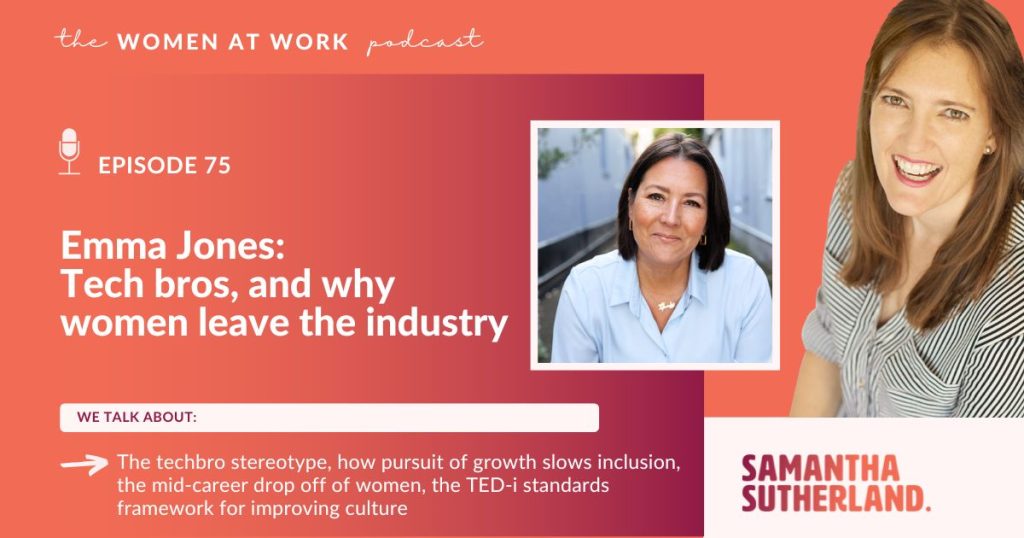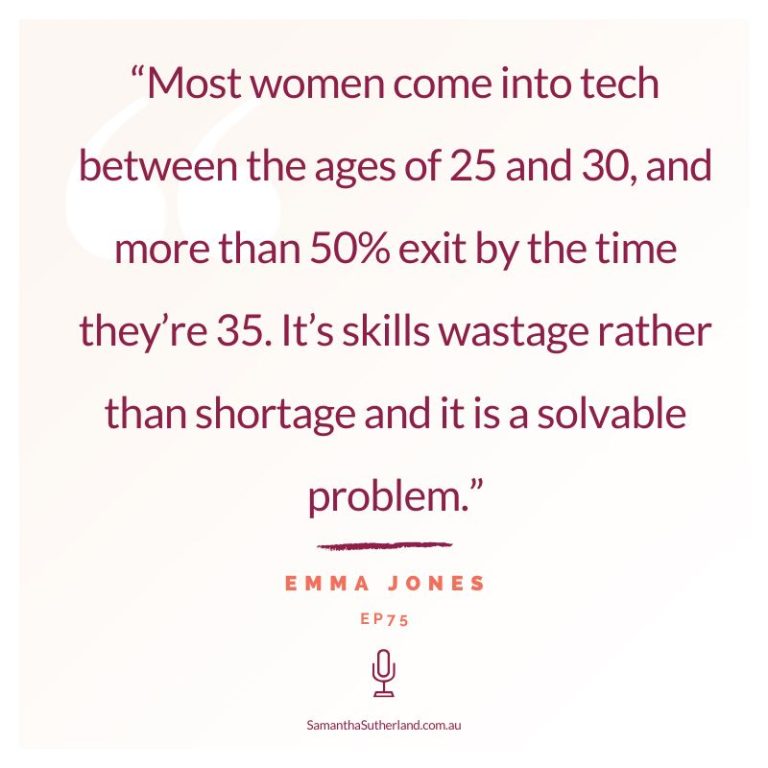
To make sure you don’t miss future episodes of Women at Work, subscribe on iTunes, Spotify or wherever you get your podcasts!
The technology industry has a persistent gender gap. And according to RMIT university, the biggest single opportunity to close Australia’s digital skills gap is (drumroll please)… women.
But here’s the kicker – this isn’t just about tech. This is about power, money, and who gets to shape the future. When women make up only 30% of the technology workforce in an industry that’s literally building tomorrow, we’re all missing out. And with a critical shortage of skilled workers in tech, fixing this gap isn’t just nice to have – it’s economic survival.
That’s exactly what today’s guest, Emma Jones, spends her time fighting for. Emma founded Project F with the express purpose of reducing the number of women abandoning technology mid-career – because yes, they’re leaving in droves, and it’s not because they can’t code.
She launched Australia’s first national industry standards for the tech sector, the T-EDI standards, alongside the Tech Council of Australia. And as a busy mother of four, she embodies the balance between career and family life that she advocates for in the workplace. But Emma’s not here to give you the usual “get more girls into STEM” speech.
This passionate advocate is moving the conversation beyond blaming the pipeline to tackle the real question: why are we losing talented women who’ve already made it into tech? What are the invisible barriers that push them out? And most importantly – what does this mean for all of us living in a world increasingly run by technology?
Whether you work in tech or just live with it every day (spoiler alert: that’s everyone), this conversation will change how you think about who gets to build our digital future.
In this episode we discuss:
- The tech industry is growing four times faster than any other industry and in 2050 70% of jobs will be STEM-related
- There is a huge drop off of women in technology mid-career – women leave to have children and don’t return
- Often, they’re leaving for a better working environment
- There is a stereotype in tech, and women are held to a higher standard because they are the minority
- Innovation is fueled by VC funding and the imperative for growth and speed. Founders don’t want to do things (like gender equality work) that might slow them down
- Emma’s realisation she was ‘putting lipstick on a pig’ rather than driving true structural change
- 50% of women leave the tech industry by 35
- The Ted-i Standards Emma developed to retain women in tech
- The importance of belonging, culture and values, and the role leadership play

About Emma Jones
Emma Jones is a trailblazing advocate for gender diversity in the tech industry and the Founder and CEO of Project F. With over 30 years of experience in talent management and people strategy, Emma has developed a deep understanding of the unique challenges faced by women in technology. In 2018, she founded Project F with the express purpose of reducing the number of women abandoning technology mid-career by addressing systemic and cultural barriers.
Emma’s career has spanned global markets, including the UK, US, and Australia. Her passion for creating innovative products that require diverse perspectives led her to develop the Technology Equity, Diversity and Inclusion (T-EDI) standards, an evidence-based certification framework launched in 2024. This groundbreaking initiative enables companies to assess their performance against 10 equity, diversity, and inclusion benchmarks, providing clear guidance and accountability for creating inclusive work environments.
As a strategist, mentor, and gender equality advocate, Emma is also the founder of the not-for-profit tech community “Men Championing Change” and “The F Factor,” a women-in-tech community group.
Emma’s mission to change the culture of tech extends beyond her professional endeavors. As a busy mother of four, she embodies the balance between career and family life that she advocates for in the workplace. Her unique approach combines unapologetic feminism with practical, systemic solutions to address the persistent challenge of creating sustainably gender-diverse technology teams.
